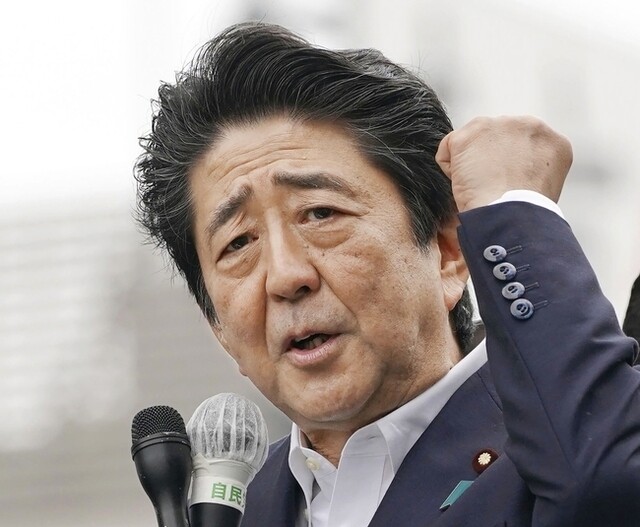hankyoreh
Links to other country sites 다른 나라 사이트 링크
[Editorial] Cooperation between S. Korean government and businesses more crucial than ever

After imposing export controls on three key materials, Japan is now pushing ahead with its plan to remove South Korea from its “white list.” If it actually goes ahead with this, the result will be difficulties importing key materials and serious damage to the bilateral relationship of trust with Japan. The Japanese government should bear in mind that both its export controls and its white list removal measures have been characterized as violations of WTO norms.
The white list removal is taking the form of an amendment of an “export decree for strategic goods” by Japan’s Ministry of Economy, Trade, and Industry. The current schedule has a public comment period through July 24, after which a Cabinet meeting will be held to finalize and proclaim the measures, which go into effect three weeks later. Once this happens, the comprehensive permit system (with a three-year validity period) will be abruptly replaced with an individual permit system (with renewable validity periods of six months or more), forcing South Korea to undergo reviews for every importation of key materials. This approach is damaging to bilateral relations and should be withdrawn.
Ahead of the WTO discussions, Japan is expected to cite Article XXI of GATT (on “Security Exceptions”) as a key basis for both its controls on three export items and its plan to kick South Korea off its white list. The argument is that the trade retaliation measures are intended for essential national security protections and are not subject to legal action. But with its regulations on the three materials, Japan merely leaked speculation about the “possibility” of their being transported into North Korea, without offering any evidence. It also has failed to produce any concrete facts since a working-level meeting of department directors on July 12 to justify invoking Article XXI.
In addition to these issues, analysts are saying South Korea’s removal from the white list is a violation of GATT’s Article I-1 (on “General Most-Favoured-National Treatment”) barring discrimination among member nations. In other words, it violates the principle that in the absence of clear grounds for exceptions, the same items require the same treatment. Japan needs to provide a suitable answer on this. It also needs to answer about the possibility of its actions being in violation of GATT’s Article XI-1 requiring WTO member countries not to prohibit or restrict exports through the use of permits.
With WTO General Council set to address export controls on the three materials as part of the agenda for an upcoming meeting in Geneva on July 23–24, the South Korean government will need to focus its energies on actively emphasizing the unjustness of Japan’s measures to the international community and winning support for its position from countries around the world. Along with this international opinion campaign, it is more crucial than ever to foster a mood of coordination between the government and domestic businesses and cooperation across party lines by politicians.
Please direct comments or questions to [english@hani.co.kr]

Editorial・opinion
![[Column] Has Korea, too, crossed the Rubicon on China? [Column] Has Korea, too, crossed the Rubicon on China?](https://flexible.img.hani.co.kr/flexible/normal/500/300/imgdb/original/2024/0419/9317135153409185.jpg) [Column] Has Korea, too, crossed the Rubicon on China?
[Column] Has Korea, too, crossed the Rubicon on China?![[Correspondent’s column] In Japan’s alliance with US, echoes of its past alliances with UK [Correspondent’s column] In Japan’s alliance with US, echoes of its past alliances with UK](https://flexible.img.hani.co.kr/flexible/normal/500/300/imgdb/original/2024/0419/2317135166563519.jpg) [Correspondent’s column] In Japan’s alliance with US, echoes of its past alliances with UK
[Correspondent’s column] In Japan’s alliance with US, echoes of its past alliances with UK- [Editorial] Does Yoon think the Korean public is wrong?
- [Editorial] As it bolsters its alliance with US, Japan must be accountable for past
- [Guest essay] Amending the Constitution is Yoon’s key to leaving office in public’s good graces
- [Editorial] 10 years on, lessons of Sewol tragedy must never be forgotten
- [Column] A death blow to Korea’s prosecutor politics
- [Correspondent’s column] The US and the end of Japanese pacifism
- [Guest essay] How Korea turned its trainee doctors into monsters
- [Guest essay] As someone who helped forge Seoul-Moscow ties, their status today troubles me
Most viewed articles
- 1[Column] The clock is ticking for Korea’s first lady
- 2After 2 months of delayed, denied medical care, Koreans worry worst may be yet to come
- 3[Column] Has Korea, too, crossed the Rubicon on China?
- 4US overtakes China as Korea’s top export market, prompting trade sanction jitters
- 5[Correspondent’s column] In Japan’s alliance with US, echoes of its past alliances with UK
- 6[Editorial] When the choice is kids or career, Korea will never overcome birth rate woes
- 7Hong Se-hwa, voice for tolerance whose memoir of exile touched a chord, dies at 76
- 8All eyes on Xiaomi after it pulls off EV that Apple couldn’t
- 9More South Koreans, particularly the young, are leaving their religions
- 10John Linton, descendant of US missionaries and naturalized Korean citizen, to lead PPP’s reform effo